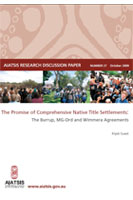The Promise of Comprehensive Native Title Settlements: The Burrup, MG-Ord and Wimmera Agreements
In 2008, the Commonwealth Government took a great leap forward in embracing the glittering promise of the Mabo decision and the potential of native title for Australia. Prime Minister Rudd’s eloquent and empathetic apology speech honoured Australia’s Indigenous peoples as the world’s oldest living culture and apologised for past laws and policies that had caused suffering. The Prime Minister urged the forging of a new future between Indigenous and non Indigenous Australians with an ‘absolute premium on respect, cooperation and mutual responsibility’, where we begin the hard work of finding ‘new solutions to enduring problems where old approaches have failed.’
The Commonwealth Attorney General Robert McClelland and Indigenous Affairs Minister Jenny Macklin announced that as part of this new future, native title was no longer to be isolated from mainstream Indigenous affairs, languishing as an end in itself after years of tortuous litigation. Instead, native title was recognised as ‘critical to economic development’ and that a ‘native title system which delivers real outcomes in a timely and efficient way … is a key priority of the Rudd Labor government’. Native title has a ‘crucial role to play’ in implementing the commitments made by the Prime Minister by providing the foundation for ‘comprehensive settlements’ of land related issues. Such comprehensive settlements would be a truly ‘whole of government initiative, encompassing housing, economic development, health, law and order and leadership and governance.’
By acknowledging this role for native title, the Commonwealth positions itself as embracing the real opportunities of the Mabo decision, which Minister Macklin (quoting Noel Pearson) names as the ‘best opportunity for the resolution of colonial grievances between Indigenous and non Indigenous Australians … the cornerstone for reconciliation – legally, politically, historically and morally’ and not ‘simply a legal doctrine relating to real estate’.
